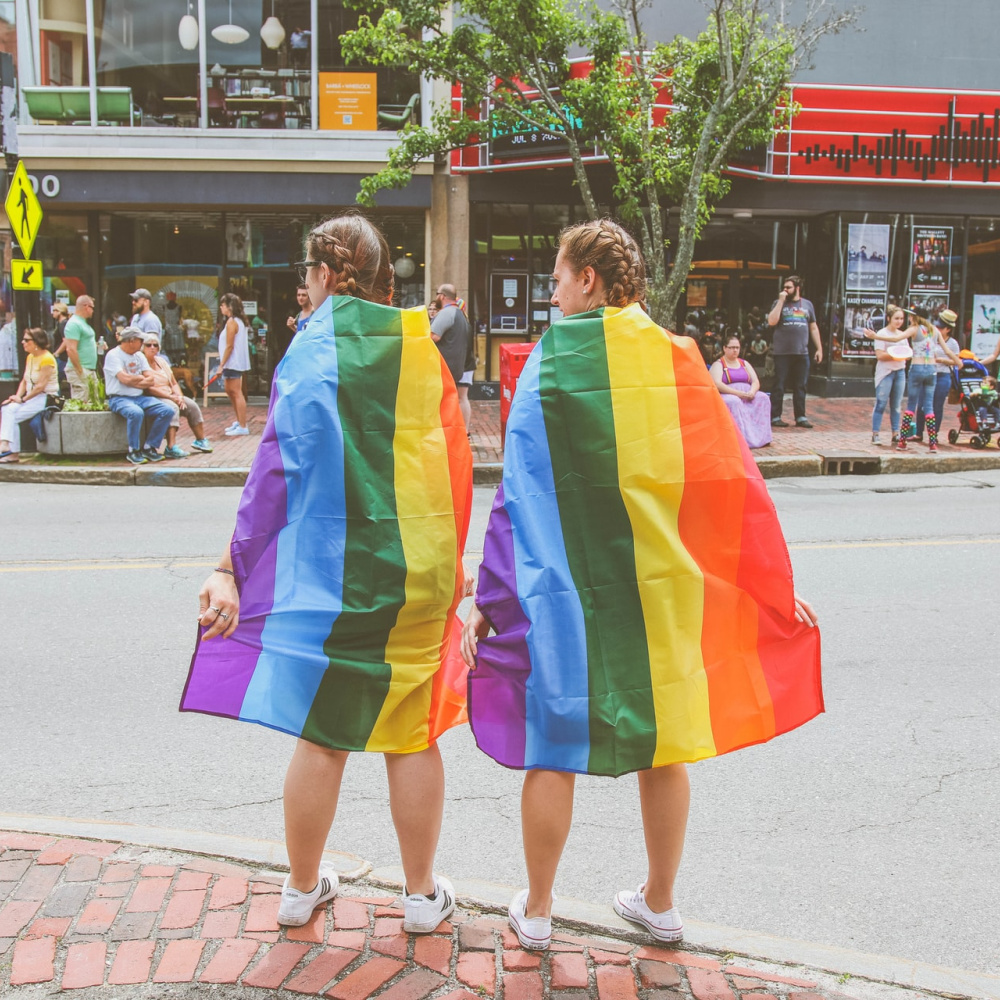Chances are good that at some point, you’ve been asked to state your pronouns—in work meetings, school classes, doctor’s offices, or elsewhere. Or perhaps you’ve seen people include their pronouns in email signatures, in their online display names, or on name badges. As of 2018, there’s even an International Pronouns Day—the third Wednesday of October.
More and more people believe that stating one’s pronouns and being careful to use others’ preferred pronouns is a sign of respect and inclusiveness toward those who identify as transgender or nonbinary. “Misgendering” a trans-identified or nonbinary person can even be considered hate speech. In New York City and Canada, it is illegal in some contexts to repeatedly refuse to use someone’s preferred pronouns.
It’s easy to think that acquiescing to someone’s choice of pronouns is an easy concession to make. One prominent Latter-day Saint social media influencer often says that using others’ preferred pronouns “costs me nothing.” A leader for a transgender support group, quoted on a popular website aimed at Latter-day Saints, states that using someone’s pronouns is “another way of saying ‘I love you.’” But is declaring one’s pronouns and using others’ preferred pronouns really a simple, benign gesture of respect? Or does this practice come at a cost?
Acceptance of Radical Gender Ideology
Like a plant attached to roots you may not see, the use of preferred pronouns is attached to a broader belief system commonly known as gender ideology, which is contrary to both the Christian gospel and established science. This ideology asserts that one’s feelings determine one’s gender and that gender identity is more important than biology. It includes the assumption that people can’t tell what sex or gender one is based on physical appearance, even though people instinctively recognize gender correctly the vast majority of the time. (The concepts of sex and gender are often used interchangeably in these discussions.) This ideology also suggests that biological sex can be changed, even though the reality is that one’s sex is in every cell of a person’s body; only superficial changes can be made. Using opposite-sex or other pronouns for minors is part of a social transition. It reinforces an identity that might otherwise be temporary and can lead to a medicalized future that a minor cannot fully comprehend
Frequently, the existence of intersex conditions is used to support the belief that anyone might have a sex or gender that doesn’t align with their physical characteristics. However, people with intersex conditions, or disorders of sex development (DSDs), are still either female or male. One’s sex is determined by which reproductive role one’s body is organized to perform. There are only two reproductive roles, which is why every person on the planet has two biological parents, one female and one male. Only .018% of the population has a condition in which sex is ambiguous.
In short, the practice of stating your pronouns and asking for others’ pronouns is a ritual that is grounded in ideology, not science—and an ideology that has a lot to say about many personal and crucial decisions in anyone’s life trajectory. So when we engage in these pronoun rituals, we cannot avoid affirming some of that ideology in a way that blurs the distinction between male and female.
Why Is It Essential to Recognize Sex Differences?
Does it really matter whether people understand sex and gender differently and use language accordingly? Shouldn’t we believe “To each his (or her or their or zir) own”? Let’s look at some reasons why we need to understand the meaning of biological sex, why it is more important than how we feel, and why our language should not distort the fundamental differences between females and males.
Family. As stated in The Family: A Proclamation to the World, “All human beings—male and female—are created in the image of God. Each is a beloved spirit son or daughter of heavenly parents, and, as such, each has a divine nature and destiny. Gender is an essential characteristic of individual premortal, mortal, and eternal identity and purpose.” The Church has clarified that the word gender in the proclamation refers to “biological sex at birth.”
If we stop recognizing the difference between males and females, we stop understanding how human beings are created. When we lose this understanding, we lose sight of the primary purpose of families—which is for mothers and fathers to create and raise children together. An understanding of male and female reproductive differences is required for civilization to continue. This knowledge is as basic and foundational as it gets.
Physical health. Failing to understand the differences between females and males carries risks to physical health. For example, females and males may experience different symptoms of some medical conditions, such as heart disease. Women and men do not metabolize certain drugs in the same way. Females and males have different physiological structures, so they are affected differently by events such as automobile accidents. Pharmaceutical researchers, medical professionals, engineers, and others must understand these differences in order to address them appropriately.
Safety. In general, males have significant physical advantages over females, such as greater muscle mass and larger and stronger bones. Regardless of claimed gender identity, biological males commit the vast majority of violent crimes, including sex crimes. Because most people instinctively recognize the differences between males and females, they are thereby able to gauge certain safety risks. Most women have had the experience of being in an isolated area, hearing footsteps behind them, and then feeling either relief or uneasiness based on whether they see that the person is female or male.
As one writer put it, pronouns that don’t align with biological sex when used regularly “dull your [women’s] defenses. They change your inhibitions. … You’ve had a lifetime’s experience learning to be alert to ‘him’ and relax to ‘her.’ For good reason. This instinctive response keeps you safe.”
Male and female difference is God-ordained and makes humankind possible
Understanding sex differences has implications for sex-segregated spaces such as restrooms, changing rooms, spas, college dormitories, and other areas in which women may be in states of undress, sleeping, or vulnerable in other ways. Most males are not threats to safety, including trans-identifying males. But when women are in the company of strangers, they naturally don’t know who is a threat and who is not. Being able to readily recognize who is male and who is female can help keep girls and women safe and also help them feel safe, which should not be lightly dismissed.
Fairness. Increasingly, awards, recognition, and opportunities intended for females have been given to trans-identified males. In March, Rachel Levine, U.S. Assistant Secretary for Health, was named one of USA Today’s 12 women of the year. Amy Schneider is recognized as Jeopardy’s highest-winning female participant, while Martine Rothblatt was recognized as the United States’ highest-paid female CEO in 2014. And in 2018, the UK’s Philip Bunce, who identifies as genderfluid and has a female alter ego named Pips or Pippa, was named one of the Financial Times’ top 100 champions of women in business.
Trans-identifying males have sometimes been allowed to compete against female athletes, which eliminates fairness due to males’ physiological advantages. Lia Thomas received significant publicity for competing with the University of Pennsylvania women’s swim team and later being nominated for the NCAA woman of the year award. Other trans-identifying male athletes excelling in the women’s category include weightlifter Laurel Hubbard, who competed in the Olympics and won a silver medal in the 2017 World Masters Games; cyclist Veronica Ivy, a two-time masters world champion; and CeCe Telfer, who, as a college senior in 2019, won the Division II NCAA championship in the 400-meter hurdles and was named Outsports’ female athlete of the year. (More trans-identified males excelling in women’s sports are listed here. For more information about male advantages in women’s sports, see here.)
Who Else Is Affected?
Children and teenagers. Using opposite-sex or other pronouns for minors is part of a social transition. It reinforces an identity that might otherwise be temporary and can lead to a medicalized future that a minor cannot fully comprehend. Society’s current understanding of gender is an abstract and ever-evolving concept that can be confusing and destabilizing for many children.
Gender-questioning and transgender individuals. Asking for someone’s pronouns is not always welcomed by people who are questioning their gender. Some might be in a state of indecision; asking them to state their pronouns might prematurely “out” them or make them feel that they must immediately claim a particular identity before they are ready. And to some transgender individuals, it might suggest that they do not appear to be the gender they identify with.
Individuals on the autism spectrum or who have obsessive-compulsive disorder. People with autism often ruminate over one or two interests or subjects. As one writer said, “For a kid who is prone to obsessive thinking, intrusive thoughts and/or hyper fixating, this constant request for ‘preferred pronouns’ can lead to obsessing over identity in unnecessary and unhealthy ways. … Once a slew of teachers keeps asking this question, a neurodivergent child may become fixated on trying to find the answer. Unsure, they will likely turn to the internet for advice. They may pose a question into the cyber void, ‘How do I know what gender I am?’ More often than not, the internet will respond, ‘If you are asking this question, then you are trans.’”
Is It Ever Appropriate to Use Another’s Preferred Pronouns?
Some might choose to use older adults’ preferred pronouns if they have consistently presented as the opposite sex over time. Some might decide to use preferred pronouns only in certain settings. And as previously mentioned, in some areas, it may be against the law to repeatedly refuse to use another’s preferred pronouns.
When it comes to minors and young adults, the issues are particularly sensitive. If you are dealing with a situation that seems exceptional and you are considering using a minor’s preferred pronouns, it is important to consult with parents.
One alternative to using another’s preferred pronouns is to repeat the person’s name instead. This may sound awkward, but it can indicate a desire to compromise by not using unwanted pronouns. (It should be noted that this won’t be enough for everyone, as a recent Utah lawsuit demonstrates.)
What if you are asked about your own pronouns? Consider saying, “I don’t do that,” or simply stating what your biological sex is.
Regardless, it is a fundamental human right not to be forced to utter certain words. If we can be compelled to reinforce untruths regarding gender—or to use words that others have made up, such as neopronouns—where does this stop? What words will the next social movement require us to say?
The importance of male and female differences is set forth from the beginning of the Bible: “So God created man in his own image, in the image of God created he him; male and female created he them” (Genesis 1:27). Male and female difference is God-ordained and makes humankind possible. Throughout history, many languages have reflected this beautiful reality. Changing language to blur and distort what it means to be male and female may be seen as an attempt to “correct” what God Himself has established and which thousands of years of civilization are predicated upon. The gravity of this, and the tremendous risk we run by attempting to upend it, should not be underestimated.

















